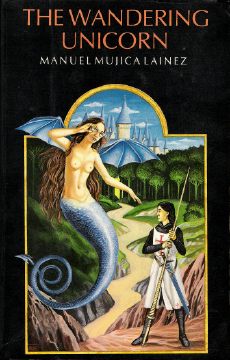

 Manuel Mujica Laínez, The Wandering Unicorn
Manuel Mujica Laínez, The Wandering Unicorn
This is an enchanting fantasy novel involving Aiol, a young knight of the Lusignan family, and the guardian-spirit of the Lusignans, Melusine - so judging it as a realistic historical novel would not be entirely fair. It is more in the spirit of the mediæval faerie romance. Given it was written in the mid-1960s, the interpretation of the historical characters is now rather dated (the traditional stereotyping of Agnes, Eraclius, Paschia de Riveri). However, the portrayal of Baldwin IV is very endearing, and Melusine herself - the bespectacled water-faerie who takes on male human form - is a delightful narrator. The involvement of faerie characters, including Oberon from the romance of Huon de Bordeaux, works well, in that it is a fantasy-element appropriate to the Middle Ages. There are also elements from trobador legends such as the tale of the Eaten Heart of Cabestanh. Here is part of Melusine's assessment of the king:
Popular instinct was accurate in one thing, nevertheless: Baldwin would display indomitable courage and strength before he died. A higher power sustained that great prince throughout his short life, and when I reflect on his disabilities and what he had to contend with, I know he was a saint. If you object that the opinions of a fairy on spiritual questions are of no value, then let me emphasize again that I was a witness, that my direct testimony is now unique and therefore most important. I have never been, nor shall I be, a fairy-story fairy in a pixie hood, fluttering by woodland springs for the benefit of personable young men. I adored personable young men (to be honest, I still do), and when fate and tradition so decreed I certainly lingered by a spring for Raimondin. But I am chiefly noted for my castle-building - those superb castles! - and the generous self-denying passion you are reading about, for which I was prepared humbly to forego my dearest privileges. I do think that loving like that, in abnegation and actual servitude, qualifies me, in spite of my non-human essence, as a responsible person on the human scale; and I say again, with many competent historians, that Baldwin was a saint, a wonder-worker. How else explain what I shall have to tell?
Back to
TOP

